新编大学英语 综合教程 3 第3版
浙江大学《新编大学英语综合教程(3)》(第3版)学习指南-unit9【圣才出品】

1 / 44
圣才电子书 十万种考研考证电子书、题库视频学习平台
at the wheel 在驾驶;掌舵;指挥,控制 【例句】①With her at the wheel, the company began to prosper. 有了她当主管,公 司开始兴旺起来。
②He said that if he fell asleep at the wheel she was to wake him up. 他说如果他开车时睡着了,她一定叫醒他。
clear and melodious 清脆
sleepy
adjss of the breeze made him feel sleepy. 柔和的微风使他昏昏欲睡。
【搭配】feel sleepy 困倦;昏昏欲睡
haze [
n. 薄雾,霾;迷糊,懵懵
【词组】soothe a toothache 缓解牙痛
soothe your soul 安抚心灵
soothe one’s anger 劝慰某人不要生气
savage [
] adj. 凶残的,野蛮的,残暴的
n. 野人,未开化的人
【例句】Yu Min is savage girlfriend of Joemig. 余敏是乔明的野蛮女友。
bracket
n. 托架,支架,括号
v. 括在一起;归为同类,相提并论
【例句】Don’t bracket them (together). 不要把他们相提并论。
inattention [
n. 疏忽,不注意,粗心
【例句】These mistakes are often the result of inattention and carelessness. 这些错
新编大学英语综合教程3第三版unit9music
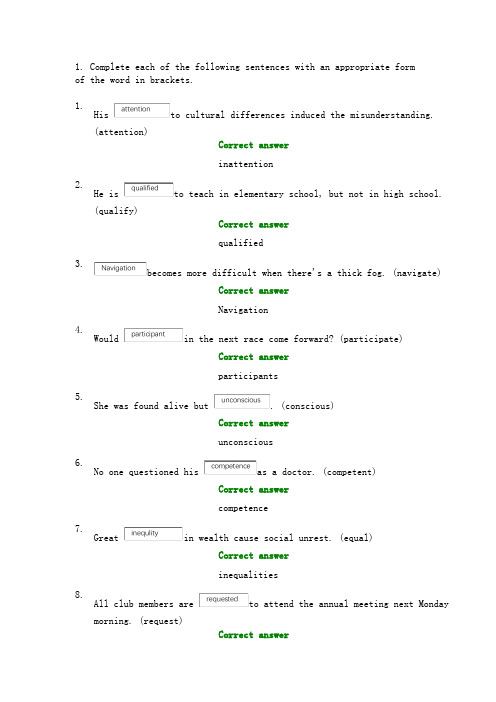
1. Complete each of the following sentences with an appropriate form of the word in brackets.1.(attention)Correct answerinattention2.(qualify)Correct answerqualifiedCorrect answerNavigation4.Correct answerparticipants5.Correct answerunconscious6.Correct answercompetence7.Correct answerinequalities8.morning. (request)Correct answerrequested9.Correct answervaried10.Correct answerpartners2. Fill in each of the blanks with an appropriate preposition or adverb.11.Correct answerin12.Correct answerof13.Correct answerto14.accident.Correct answerat15.Correct answerbeyond16.Your answer Correct answerfrom from17.Your answer Correct answerto to18.Your answer Correct answeron on19.Your answer Correct answerin inYour answer Correct answerOn On3. Complete each of the following sentences by choosing the best answerfrom the choices given.21. The buses, ___________ were already full, were surrounded by an angry crowd.A. most of whichB. both of whichC. few of themD. those of which22. There's only one man ____________ the job.A. qualified forB. qualifying ofC. qualified toD. qualifying for23. The topic is ____________ my field.A. offB. beyondC. belowD. beneath24. Very seldom ____________ that two clocks or watches exactly agree.A. you findB. you will findC. you do findD. do you find25. I was ___________ by my grandmother in the western suburbs of Hangzhou.A. brought onB. brought aboutC. brought upD. brought out26. I'm sorry to ____________ on your conversation.A. cut acrossB. cut outC. cut inD. cut down27. A fire _____________ during the night when all the workers were asleep.A. broke upB. broke throughC. broke inD. broke out28. The plane _____________ despite the dense fog.A. took offB. took downC. took upD. took on29. Burning leaves _____________ thick smoke hovering over the small village.A. gave outB. gave upC. gave offD. gave in30. After Tom passed his driving test, he ___________ an application for hisdriver's license.A. filled awayB. filled outC. filled upD. filled with。
新编大学英语第三版综合教程3答案
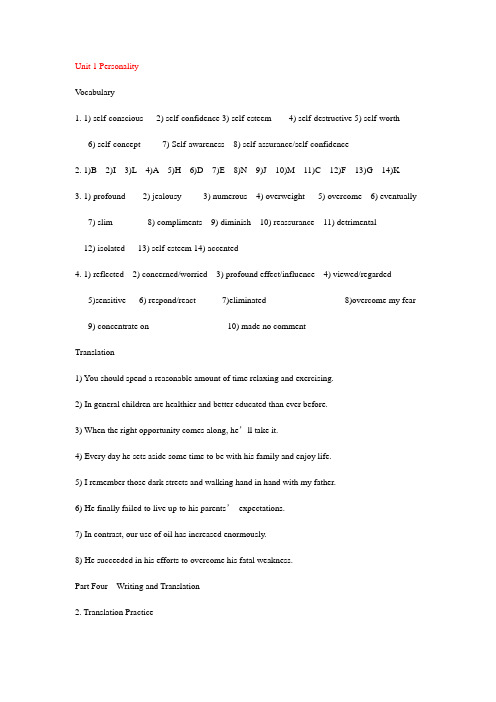
Unit 1 PersonalityV ocabulary1. 1) self-conscious 2) self-confidence 3) self-esteem 4) self-destructive 5) self-worth6) self-concept 7) Self-awareness 8) self-assurance/self-confidence2. 1)B 2)I 3)L 4)A 5)H 6)D 7)E 8)N 9)J 10)M 11)C 12)F 13)G 14)K3. 1) profound 2) jealousy 3) numerous 4) overweight 5) overcome 6) eventually7) slim 8) compliments 9) diminish 10) reassurance 11) detrimental12) isolated 13) self-esteem 14) accented4. 1) reflected 2) concerned/worried 3) profound effect/influence 4) viewed/regarded5)sensitive 6) respond/react 7)eliminated 8)overcome my fear9) concentrate on 10) made no commentTranslation1) You should spend a reasonable amount of time relaxing and exercising.2) In general children are healthier and better educated than ever before.3) When the right opportunity comes along, he’ll take it.4) Every day he sets aside some time to be with his family and enjoy life.5) I remember those dark streets and walking hand in hand with my father.6) He finally failed to live up to his parents’expectations.7) In contrast, our use of oil has increased enormously.8) He succeeded in his efforts to overcome his fatal weakness.Part Four Writing and Translation2. Translation Practice1) It is believed that pessimism often leads to hopelessness, sickness and failure.2) Optimism, by contrast, can make you happy, healthy and successful.3) When you fail in something, profit from the failure as a learning experience.4) Think about your strengths and build up self-confidence in front of problems or difficulties.5) Don’t let negative thoughts hold you back.6) Everyone has experienced failures and disappointments, so don’t blame yourself too much.Unit 2 Myths and LegendsV ocabulary1. 1) A. invitation B. invited C. inviting 2) A. prepare B. prepared C. preparation D. preparatory/preparation3) A. discoveries B. discoverers C. discovered4) A. approval B. approve C. approved D. approving E. disapprove5) A. eloquent B. eloquence C. eloquently6) A. faithful B. unfaithful/faithless C. faith d. faithfully7) A. occasional B. occasionally C. occasion8) A. delivery B. delivering C. delivered9) A. troublesome B. troubled C. troubled D. troubling 10) A. assurance B. assured C. assure2. 1) got/ran into trouble 2) no trouble 3) asking for trouble 4) have …trouble 5) troublewith6) in serious/deep/big trouble 7) get/getting …into trouble 8) took the trouble3. 1) with a pattern of roses 2) prepared a wonderful/goof meal for us3) promised faithfully 4) deliver this letter5) a selection of milk and plain chocolate 6) keep out of mischief/behave themselves7) the sound of distant thunder 8) received approval from the government9) in spite of the fact that he drank too much 10) agree whether the drug is safe or notPart Three Further Development5. Complete the following Ancient Chinese story by translating the Chinese into English1) the true reason why there was no such animal in Guizhou2) they were of no use at all in this place3) when he saw the donkey all of a sudden, he thought it was a monster4) he hid himself in the trees while looking at the donkey5) what kind of animal is this and why does it look different from other animals that I’ve seen?6) But one day the donkey stretched its thin neck and cried7) the tiger discovered that the donkey didn’t have any other skills besides crying8) But he dared not rush to it and eat it just as he did to other animals9) This did irritate the donkey (made the donkey angry), who raised its hind leg and kicked thetiger10) This time he rushed to it without hesitation and bit its rhroatPart Four Writing and Translation2. Translation Practice万物之初天地还是一体充满混沌。
新编大学英语综合教程3第三版部分课后答案
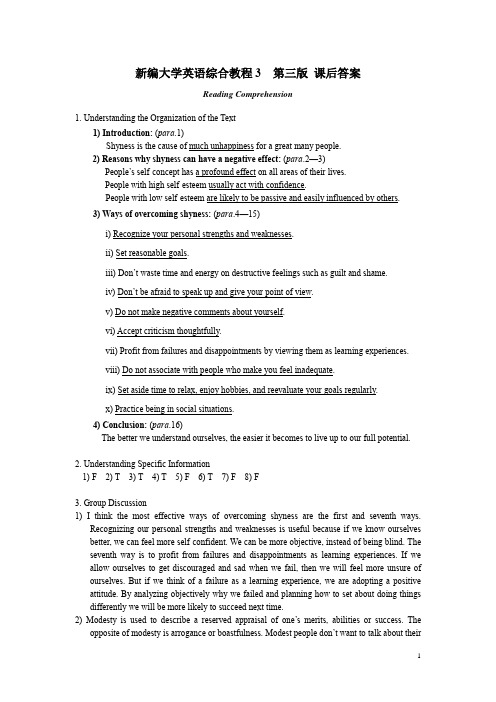
新编大学英语综合教程3 第三版课后答案Reading Comprehension1. Understanding the Organization of the Text1) Introduction: (para.1)Shyness is the cause of much unhappiness for a great many people.2) Reasons why shyness can have a negative effect: (para.2—3)People’s self-concept has a profound effect on all areas of their lives.People with high self-esteem usually act with confidence.People with low self-esteem are likely to be passive and easily influenced by others.3) Ways of overcoming shyness: (para.4—15)i) Recognize your personal strengths and weaknesses.ii) Set reasonable goals.iii) Don’t waste time and energy on destructive feelings such as guilt and shame.iv) Don’t be afraid to speak up and give your point of view.v) Do not make negative comments about yourself.vi) Accept criticism thoughtfully.vii) Profit from failures and disappointments by viewing them as learning experiences.viii) Do not associate with people who make you feel inadequate.ix) Set aside time to relax, enjoy hobbies, and reevaluate your goals regularly.x) Practice being in social situations.4) Conclusion: (para.16)The better we understand ourselves, the easier it becomes to live up to our full potential.2. Understanding Specific Information1) F 2) T 3) T 4) T 5) F 6) T 7) F 8) F3. Group Discussion1) I think the most effective ways of overcoming shyness are the first and seventh ways.Recognizing our personal strengths and weaknesses is useful because if we know ourselves better, we can feel more self-confident. We can be more objective, instead of being blind. The seventh way is to profit from failures and disappointments as learning experiences. If we allow ourselves to get discouraged and sad when we fail, then we will feel more unsure of ourselves. But if we think of a failure as a learning experience, we are adopting a positive attitude. By analyzing objectively why we failed and planning how to set about doing things differently we will be more likely to succeed next time.2) Modesty is used to describe a reserved appraisal of one’s merits, abilities or success. Theopposite of modesty is arrogance or boastfulness. Modest people don’t want to talk about theirabilities or achievements. Modest people know their strengths and their worth, but choose to downplay their greatness and be humble. So modesty is the result of confidence. Shyness is used to describe the uncomfortable feeling one has in the company of others. It often implies a lack of self-confidence and a timid, reserved manner. Modesty is a good personality trait while shyness in many cases is undesirable.3) Being shy isn’t necessarily a bad thing. It is appropriate and normal to be shy in some circumstances, for example, in the presence of teachers, your boss, your parents’ friends or your prospective in-laws; when you are dating someone, especially the first time; when you are with strangers; when you are in a new environment; when you’re facing a large audience. In fact, it can even be helpful to be a little shy. When you’re shy and keep silent, you may spend a little time observing the surroundings and people around before jumping right into the new situation.Vocabulary1. “Self-”is a prefix which means “of, to or by oneself or itself” .Words with the prefix “self-” that appear in the text: self-conscious, self-concept, self-assurance, self-worth, self-confidence, self-esteem, self-destructive, self-awareness, self-acceptance, self-rejection, self-confident.1) self-conscious (worried and embarrassed about what you look like or what other people think of you)2) self-confidence (belief in one’s own ability, power, judgment, etc.; confidence in oneself)3) self-esteem (the feeling that you are someone who deserves to be liked, respected, or admired)4) self-destructive (with thoughts or actions that are counter to one’s own best interests)5) self-worth (the value you give to your life and achievements)6) self-concept (one’s conception or general idea of one’s own basic character and nature)7) self-awareness (realistic knowledge and judgment about oneself)8) self-assurance/self-confidence (the belief that you are able to deal with people and problems easily)2. Part A1) G 2) I 3) A 4) F 5) C 6) D 7) J 8) B 9) E 10) HPart B1) profound 2) jealousy 3) overcome 4) eventually 5) compliments6) diminish 7) reassurance 8) detrimental 9) isolated 10) accented3. 1) reflected 2) concerned/worried 3) profound effect/influence 4) viewed/regarded 5) sensitive 6) respond/react 7) eliminated 8) overcome my fear 9) concentrate on 10) made no commentTranslation1. Shyness can vary from feeling mild discomfort to high levels of anxiety that impact us in almosteverything we do.2. Despite his stubbornness, he knew in his heart that he should avoid arousing any suspicions.3. It will be interpreted as criticism no matter what you say.4. Let’s not allow ourselves to be upset by trifles (which) we should despise and forget.5. Too much time spent dwelling on the past can get in the way of enjoying life as it happens.6. People who believe they can accomplish goals and solve problems are more likely to do well inschool.Further Development1. Enriching Your Word Power1) B 2) B 3) A 4) B 5) C 6) C 7) C 8) A 9) A 10) C哈哈,等我再上传啦。
新编大学英语第三版第三册
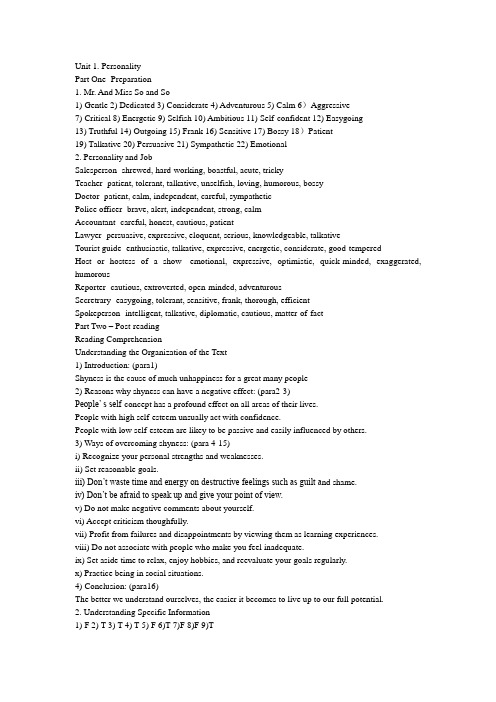
Unit 1. PersonalityPart One- Preparation1. Mr. And Miss So and So1) Gentle 2) Dedicated 3) Considerate 4) Adventurous 5) Calm 6)Aggressive7) Critical 8) Energetic 9) Selfish 10) Ambitious 11) Self-confident 12) Easygoing13) Truthful 14) Outgoing 15) Frank 16) Sensitive 17) Bossy 18)Patient19) Talkative 20) Persuasive 21) Sympathetic 22) Emotional2. Personality and JobSalesperson- shrewed, hard-working, boastful, acute, trickyTeacher- patient, tolerant, talkative, unselfish, loving, humorous, bossyDoctor- patient, calm, independent, careful, sympatheticPolice officer- brave, alert, independent, strong, calmAccountant- careful, honest, cautious, patientLawyer- persuasive, expressive, eloquent, serious, knowledgeable, talkativeTourist guide- enthusiastic, talkative, expressive, energetic, considerate, good-temperedHost or hostess of a show- emotional, expressive, optimistic, quick-minded, exaggerated, humorousReporter- cautious, extroverted, open-minded, adventurousSecretrary- easygoing, tolerant, sensitive, frank, thorough, efficientSpokeperson- intelligent, talkative, diplomatic, cautious, matter-of-factPart Two – Post-readingReading ComprehensionUnderstanding the Organization of the Text1) Introduction: (para1)Shyness is the cause of much unhappiness for a great many people2) Reasons why shyness can have a negative effect: (para2-3)People’ s self-concept has a profound effect on all areas of their lives.People with high self-esteem unsually act with confidence.People with low self-esteem are likey to be passive and easily influenced by others.3) Ways of overcoming shyness: (para 4-15)i) Recognize your personal strengths and weaknesses.ii) Set reasonable goals.iii) Don’t waste time and energy on destructive feelings such as guilt a nd shame.iv) Don’t be afraid to speak up and give your point of view.v) Do not make negative comments about yourself.vi) Accept criticism thoughfully.vii) Profit from failures and disappointments by viewing them as learning experiences.viii) Do not associate with people who make you feel inadequate.ix) Set aside time to relax, enjoy hobbies, and reevaluate your goals regularly.x) Practice being in social situations.4) Conclusion: (para16)The better we understand ourselves, the easier it becomes to live up to our full potential.2. Understanding Specific Information1) F 2) T 3) T 4) T 5) F 6)T 7)F 8)F 9)TV ocabulary1.1) self-couscious (worried and embarrassed about what you look like or what other people think of you.)2) self-confidence (belief i n one’s own ability, power, judgment, etc,; confidence in oneself)3) self-esteem (the feeling that you are someone who deserves to be liked, respected, or admired)4) self-destructive (with thoughts or actions that are counter to one’s own best interests)5) self-worth (the value you give to your life and achievements)6) self-concept (one’s conception or general idea of one’s own basic character and nature)7) self-awareness (realistic knowledge and judgment about oneself)8) self-assurance/self-confidence (the belief that you are able to deal with people and problems easily)2.1) B 2 ) I 3) L 4) A 5) H 6) D 7) E8) N 9) J 10) M 11) C 12) F 13) G 14) K3.1) profound 2)jealousy 3) numerous 4)overweight 5) overcome6) eventually 7) slim 8) compliments 9) diminish 10) reassurance11) detrimental 12) isolated 13) self-esteem 14) accented4.1) reflected 2) concerned/worried 3) profound effect/influence 4) viewed/regarded5) sensitive 6) respond/ react 7) eliminated 8) overcome my fear9) concentrate on 10) made no commentTranslation1) You should spend a reasonable amount of time relaxing and exercising.(spend time on sth/ in doing sth)2) In general children are healthier and better educated than ever before. (than ever before)3) When the right opportunity comes along, he’ll take it.4) Every day he sets aside some time to be with his family and enjoy life.5) I remember those dark streets and walking hand in hand with my father.6) He finally failed to live up to his parents’ expectations.7) In contrast, our use of oil has increased enormously.8) He succeeded in his efforts to overcome his fatal weakness.Part Three – Further Development1. Enriching Your Word Power1) B 2)B 3)A 4) B 5) D 6) C 7)B 8)C 9)A 10)A 11) C 12) BPart Four- Writing and Translation2.1) It is believed that pessimism often leads to hopelessness, sickness and failure.2) Optimism, by contrast, can make you happy, healthy and successful.3) When you fail in something, profit from the failure as a learning experience.4) Think about your strengths and build up self-confidence in front of problems or difficulties.5) Don’t let negative thoughts hold you back.6)Everyone has experienced failures and disappointments, so don’t blame yourself too much.Unit 2 Myths and LegendsPart One – Preparation4. Matching Pictures1. Aphrodite2. Ares3. Hephaestus4. Artemis5. Demeter6. Dionysus7. Poseidon 8. Athena 9. Apollo 10. hermes 11. Hera 12. ZeusPart Two – Post-reading1. Testing Your Memory1) Because they were invited to a feast in the sky.2) He saw the birds were busy preparing.3) He planned to go to the feast/ sky with the birds.4) They didn’t agree because Tortoise was mischievous/ cunning and ungrateful.5) With a sweet tongue, he convinced the birds that he was a changed man.6) He made two wings with all the features he got from each bird.7) All of You.8) Nuts, meat and fish soup, punded yam, yam soup, palm wine, etc.9) For whom have you prepared this feast?10) Because he knew the answer would be ―For all of you‖, which was his new name. So he could enjoy all the food first.11) They were very angry.12) They took back the feathers they had lent him.13) He asked him to take a message to his wife.14) Parrot, because he wanted to take advantage of the chance to get revenge.15) He asked Parrot to tell his wife to bring out all the soft things in his house and cover the ground with them so that he would be able to land safely. But Parrot told his wife to bring out all the hard and sharp things instead.16) His shell was broken into hundreds of pieces.V ocabulary1.1) A. invitation B. invited C. inviting2) A. prepare B. prepared C. preparation D. preparatory / preparation3) A. discoveries B. discoverers C. discovered4) A. approval B. approve C. approved D. approvign E. disapprove5) A. eloquent B. eloquence C. eloquently6) A. faithful B. unfaithful/ faithless C. faith D. faithfully7) A. occasional B. occasionally C. occasion8) A. delivery B. delivering C. delivered9) A. troubesome B. troulbed C. troubled D. troubling10) A. assurance B. assured C. assure2.1) got/ran into trouble 2) no trouble 3) asking for trouble 4) have…trouble5) trouble with 6) in serious/ deep/ big trouble 7) get/getting …into trouble 8) took the trouble3.1) with a pattern of roses.2) prepared a wonderful / good meal for us3) promised faithfully4) deliver this letter5) a selection of milk and plain chocolate6) keep out of mischief / behave themselves7)the sound of distant thunder8) received approval from the government9) in spite of the fact that he drank too much10)agree whether the drug is safe or notPart Three – Further Development1. Enriching Your Word Power1) C 2) C 3) A 4) B 5)A 6) B 7) A 8) B 9) B 10) A 11) B 12) APart Four – Writing and Translation2. Translation Practice万物之初,天体还是一体,充满混沌。
新编大学英语第三版综合教程3答案
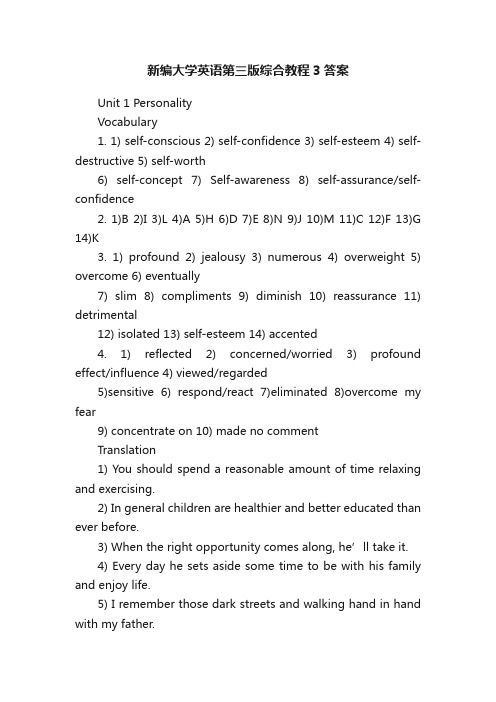
新编大学英语第三版综合教程3答案Unit 1 PersonalityVocabulary1. 1) self-conscious 2) self-confidence 3) self-esteem 4) self-destructive 5) self-worth6) self-concept 7) Self-awareness 8) self-assurance/self-confidence2. 1)B 2)I 3)L 4)A 5)H 6)D 7)E 8)N 9)J 10)M 11)C 12)F 13)G 14)K3. 1) profound 2) jealousy 3) numerous 4) overweight 5) overcome 6) eventually7) slim 8) compliments 9) diminish 10) reassurance 11) detrimental12) isolated 13) self-esteem 14) accented4. 1) reflected 2) concerned/worried 3) profound effect/influence 4) viewed/regarded5)sensitive 6) respond/react 7)eliminated 8)overcome my fear9) concentrate on 10) made no commentTranslation1) You should spend a reasonable amount of time relaxing and exercising.2) In general children are healthier and better educated than ever before.3) When the right opportunity comes along, he’ll take it.4) Every day he sets aside some time to be with his family and enjoy life.5) I remember those dark streets and walking hand in hand with my father.6) He finally failed to live up to his parents’expectations.7) In contrast, our use of oil has increased enormously.8) He succeeded in his efforts to overcome his fatal weakness.Part Four Writing and Translation2. Translation Practice1) It is believed that pessimism often leads to hopelessness, sickness and failure.2) Optimism, by contrast, can make you happy, healthy and successful.3) When you fail in something, profit from the failure as a learning experience.4) Think about your strengths and build up self-confidence in front of problems or difficulties.5) Don’t let negative thoughts hold you back.6) Everyone has experienced failures and disappointments, so don’t blame yourself too much.Unit 2 Myths and LegendsVocabulary1. 1) A. invitation B. invited C. inviting 2) A. prepare B. prepared C. preparation D. preparatory/preparation3) A. discoveries B. discoverers C. discovered4) A. approval B. approve C. approved D. approving E. disapprove5) A. eloquent B. eloquence C. eloquently6) A. faithful B. unfaithful/faithless C. faith d. faithfully7) A. occasional B. occasionally C. occasion8) A. delivery B. delivering C. delivered9) A. troublesome B. troubled C. troubled D. troubling 10) A. assurance B. assured C. assure2. 1) got/ran into trouble 2) no trouble 3) asking for trouble4) have …trouble 5) troublewith6) in serious/deep/big trouble 7) get/getting …into trouble 8) took the trouble3. 1) with a pattern of roses 2) prepared a wonderful/goof meal for us3) promised faithfully 4) deliver this letter5) a selection of milk and plain chocolate 6) keep out of mischief/behave themselves7) the sound of distant thunder 8) received approval from the government9) in spite of the fact that he drank too much 10) agree whether the drug is safe or notPart Three Further Development5. Complete the following Ancient Chinese story by translating the Chinese into English1) the true reason why there was no such animal in Guizhou2) they were of no use at all in this place3) when he saw the donkey all of a sudden, he thought it wasa monster4) he hid himself in the trees while looking at the donkey5) what kind of animal is this and why does it look different from other animals that I’ve see n?6) But one day the donkey stretched its thin neck and cried7) the tiger discovered that the donkey didn’t have any other skills besides crying8) But he dared not rush to it and eat it just as he did to other animals9) This did irritate the donkey (made the donkey angry), who raised its hind leg and kicked thetiger10) This time he rushed to it without hesitation and bit its rhroatPart Four Writing and Translation2. Translation Practice万物之初天地还是一体充满混沌。
新编大学英语第三版综合教程第三册答案
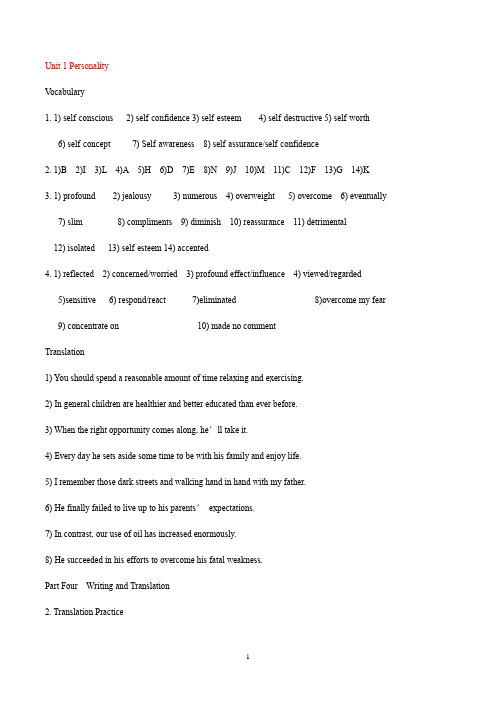
Unit 1 PersonalityV ocabulary1. 1) self-conscious 2) self-confidence 3) self-esteem 4) self-destructive 5) self-worth6) self-concept 7) Self-awareness 8) self-assurance/self-confidence2. 1)B 2)I 3)L 4)A 5)H 6)D 7)E 8)N 9)J 10)M 11)C 12)F 13)G 14)K3. 1) profound 2) jealousy 3) numerous 4) overweight 5) overcome 6) eventually7) slim 8) compliments 9) diminish 10) reassurance 11) detrimental12) isolated 13) self-esteem 14) accented4. 1) reflected 2) concerned/worried 3) profound effect/influence 4) viewed/regarded5)sensitive 6) respond/react 7)eliminated 8)overcome my fear9) concentrate on 10) made no commentTranslation1) You should spend a reasonable amount of time relaxing and exercising.2) In general children are healthier and better educated than ever before.3) When the right opportunity comes along, he’ll take it.4) Every day he sets aside some time to be with his family and enjoy life.5) I remember those dark streets and walking hand in hand with my father.6) He finally failed to live up to his parents’expectations.7) In contrast, our use of oil has increased enormously.8) He succeeded in his efforts to overcome his fatal weakness.Part Four Writing and Translation2. Translation Practice1) It is believed that pessimism often leads to hopelessness, sickness and failure.2) Optimism, by contrast, can make you happy, healthy and successful.3) When you fail in something, profit from the failure as a learning experience.4) Think about your strengths and build up self-confidence in front of problems or difficulties.5) Don’t let negative thoughts hold you back.6) Everyone has experienced failures and disappointments, so don’t blame yourself too much.Unit 2 Myths and LegendsV ocabulary1. 1) A. invitation B. invited C. inviting 2) A. prepare B. prepared C. preparation D.preparatory/preparation3) A. discoveries B. discoverers C. discovered4) A. approval B. approve C. approved D. approving E. disapprove5) A. eloquent B. eloquence C. eloquently6) A. faithful B. unfaithful/faithless C. faith d. faithfully7) A. occasional B. occasionally C. occasion8) A. delivery B. delivering C. delivered9) A. troublesome B. troubled C. troubled D. troubling 10) A. assurance B. assured C. assure2. 1) got/ran into trouble 2) no trouble 3) asking for trouble 4) have …trouble 5) troublewith6) in serious/deep/big trouble 7) get/getting …into trouble 8) took the trouble3. 1) with a pattern of roses 2) prepared a wonderful/goof meal for us3) promised faithfully 4) deliver this letter5) a selection of milk and plain chocolate 6) keep out of mischief/behave themselves7) the sound of distant thunder 8) received approval from the government9) in spite of the fact that he drank too much 10) agree whether the drug is safe or notPart Three Further Development5. Complete the following Ancient Chinese story by translating the Chinese into English1) the true reason why there was no such animal in Guizhou2) they were of no use at all in this place3) when he saw the donkey all of a sudden, he thought it was a monster4) he hid himself in the trees while looking at the donkey5) what kind of animal is this and why does it look different from other animals that I’ve seen?6) But one day the donkey stretched its thin neck and cried7) the tiger discovered that the donkey didn’t have any other skills besides crying8) But he dared not rush to it and eat it just as he did to other animals9) This did irritate the donkey (made the donkey angry), who raised its hind leg and kicked thetiger10) This time he rushed to it without hesitation and bit its rhroatPart Four Writing and Translation2. Translation Practice万物之初天地还是一体充满混沌。
新编大学英语综合教程3(第三版)课后翻译答案
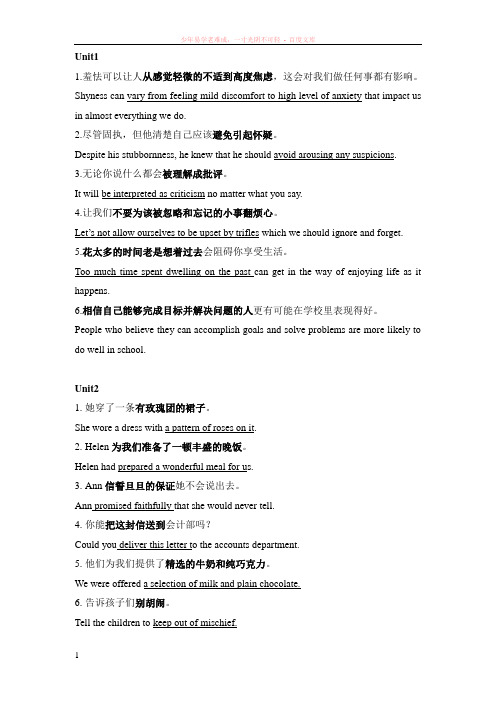
Unit11.羞怯可以让人从感觉轻微的不适到高度焦虑,这会对我们做任何事都有影响。
Shyness can vary from feeling mild discomfort to high level of anxiety that impact us in almost everything we do.2.尽管固执,但他清楚自己应该避免引起怀疑。
Despite his stubbornness, he knew that he should avoid arousing any suspicions.3.无论你说什么都会被理解成批评。
Ann promised faithfully that she would never tell.4.你能把这封信送到会计部吗?Could you deliver this letter to the accounts department.5.他们为我们提供了精选的牛奶和纯巧克力。
We were offered a selection of milk and plain chocolate.6.告诉孩子们别胡闹。
Tell the children to keep out of mischief.7.我们可以听见打雷的声音。
We could hear the sound of distant thunder.8.这个项目已经得到了政府的批准。
The project has received approval from the government.9.虽然丈夫喝酒太多,但是Kelly仍然爱着他。
Kelly loved her husband in spite of the fact that he drank too much.10.专家们看起来无法对药物是否安全取得一致建议For such a big house the price is fairly cheap, but you’ve got to take into consideration the money you will spend on repairs.8.我们能否从讨论上会议产生的问题开始?Can we begin with discussing questions arising from the last meeting?Unit41. 我过去喜欢摄影,但是现在没时间去追求其他爱好了。
- 1、下载文档前请自行甄别文档内容的完整性,平台不提供额外的编辑、内容补充、找答案等附加服务。
- 2、"仅部分预览"的文档,不可在线预览部分如存在完整性等问题,可反馈申请退款(可完整预览的文档不适用该条件!)。
- 3、如文档侵犯您的权益,请联系客服反馈,我们会尽快为您处理(人工客服工作时间:9:00-18:30)。
新编大学英语综合教程 3 第3版
课程内容包含了多种交际活动和语言技能的培养。
如听力、口语、阅读和写作等。
通过各种主题和话题的讨论,学生能够提高他们的英语交际能力和理解能力。
课程材料中包含了具有现实背景的篇章和文章,以激发学生研究英语的兴趣,并了解英语在不同文化和领域中的应用。
培养学生独立研究和合作研究的能力,使他们能够有效地运用英语进行交际和表达。
帮助学生掌握各种语言技能,如听力理解、口语表达、阅读理解和写作能力。
培养学生跨文化意识和理解,使他们能够在国际交流和合作中胜任自己的角色。
以上是《新编大学英语综合教程 3 第3版》的大纲概述,希望能够为学生提供一个全面的英语研究平台。
本教材的主要教学目标是培养学生综合运用
英语的能力,包括听、说、读、写等方面。
同时,通过教授相关课文,让学生了解不同领域的知识
和文化背景,提高他们的跨文化交际能力。
教学内容包括以下几个方面:
语音和发音练:研究正确的英语发音和语音规则的训练,以提
高口语能力。
视频和听力材料的理解和讨论:通过观看视频和听力材料,学
生能够提高对英语的理解能力,并进行相关讨论,以增强语言运用
和交流能力。
阅读和写作训练:通过阅读英语文章和进行写作练,培养学生
的阅读理解和写作能力,提高英语表达能力和语言组织能力。
口语表达和交流技巧的培养:通过口语训练和角色扮演等活动,帮助学生锻炼口语表达和交流技巧,提高口语流利度和自信心。
课后练和作业:给学生布置课后练和作业,巩固所学知识,提
高研究效果。
以上是《新编大学英语综合教程 3 第3版》的教学内容。
通过
这些方面的训练和研究,学生能够全面提升英语语言能力。
以上是《新编大学英语综合教程 3 第3版》的教学内容。
通过这些方面的训练和学习,学生能够全面提升英语语言能力。
